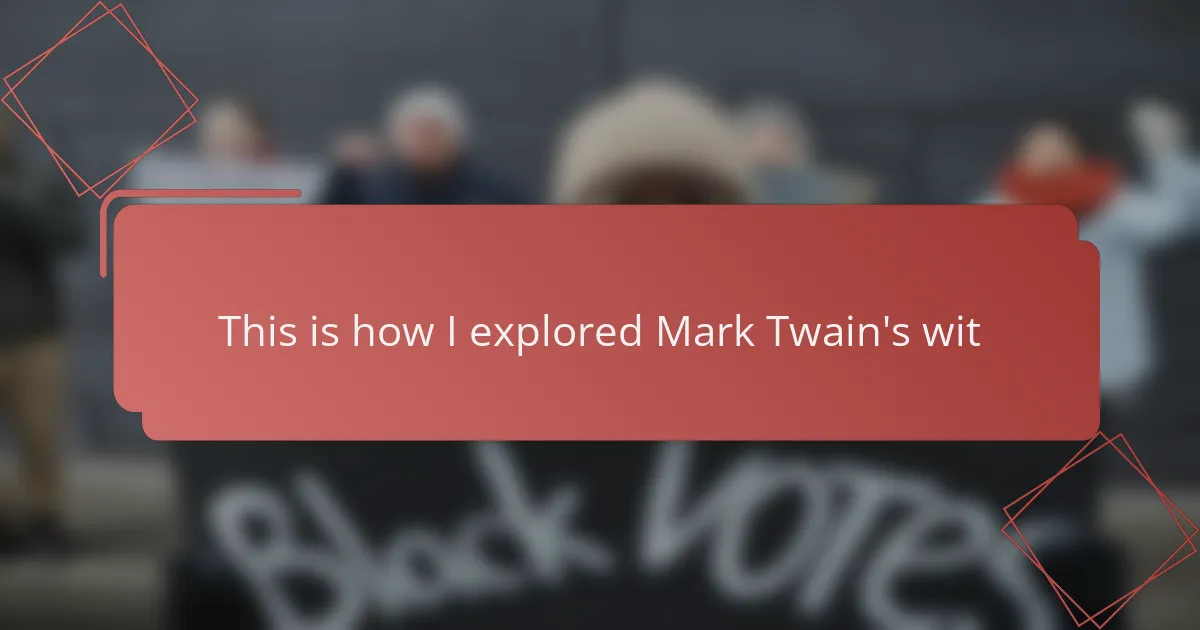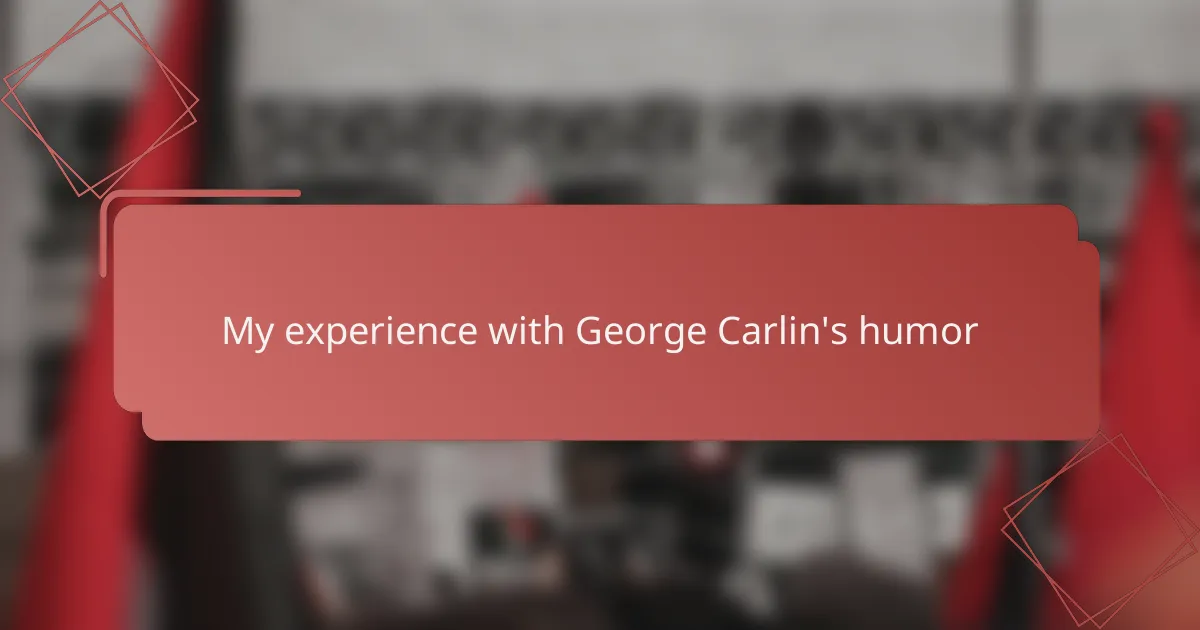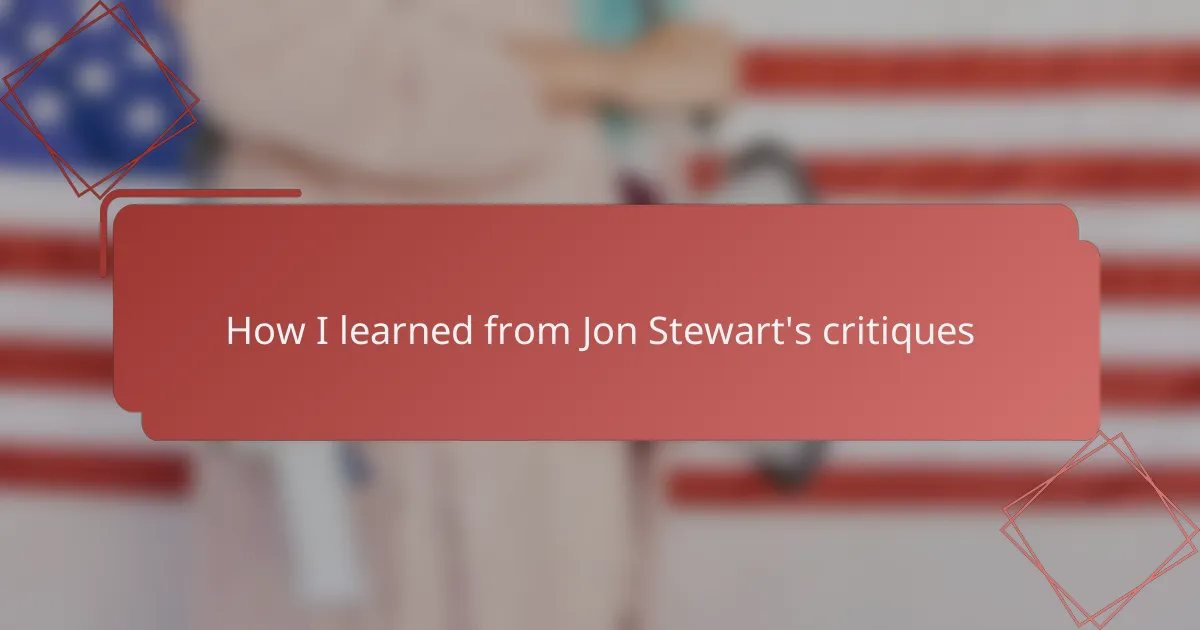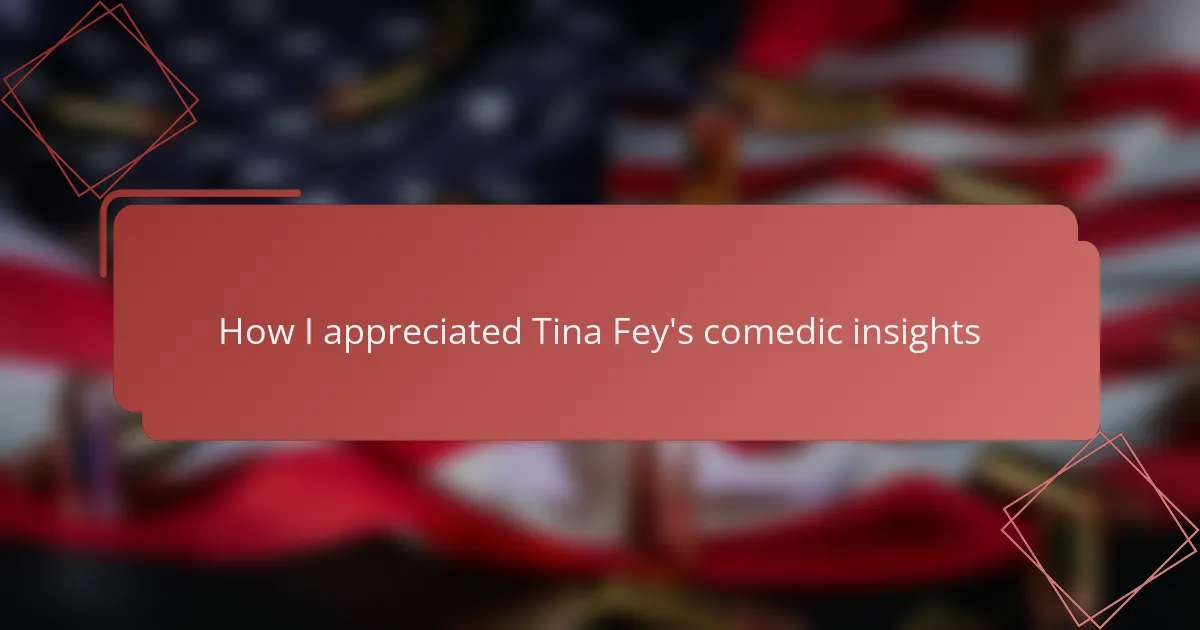Key takeaways
- Political satire, as exemplified by Mark Twain, effectively combines humor with critical examination of societal issues through techniques like irony and exaggeration.
- Twain’s use of relatable language and clever observations invites readers to reflect on their own assumptions and societal norms.
- His ability to address complex issues with subtle wit allows satire to expose uncomfortable truths without alienating audiences, making it a powerful tool for prompting thought and dialogue.
- Modern satire can draw from Twain’s methods by focusing on hypocrisy and corruption, using a humorous yet respectful tone to engage readers in political discourse.

Understanding Political Satire Basics
Political satire thrives on cleverly exposing the absurdities and contradictions in politics, weaving humor with critique. I’ve found that understanding its basics, like irony and exaggeration, is essential to appreciate the subtle wit of writers like Mark Twain. His skill was not just in making us laugh but in prompting us to think critically about societal issues.
| Element | Description |
|---|---|
| Irony | Using words that mean the opposite to highlight contradictions in political statements or actions. |
| Exaggeration | Amplifying traits or events to absurd levels to expose flaws or folly. |
| Parody | Imitating political figures or speeches humorously to critique their behavior. |
| Understatement | Downplaying serious issues to emphasize their real significance through contrast. |
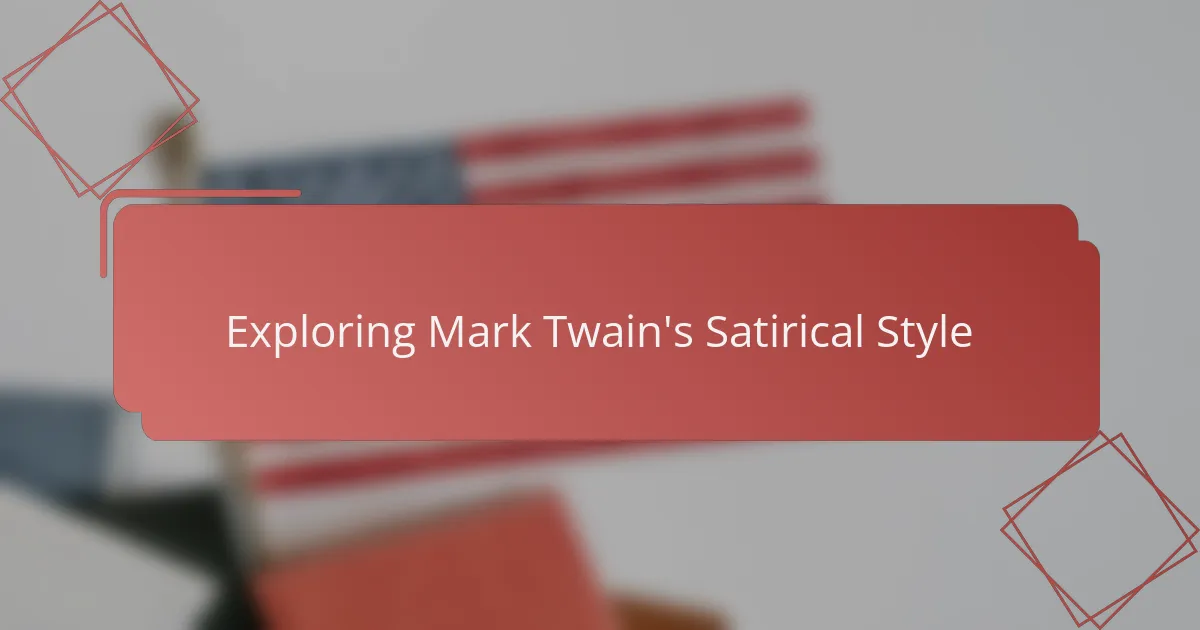
Exploring Mark Twain’s Satirical Style
Mark Twain’s satirical style is a masterclass in blending humor with sharp social critique. When I first delved into his work, I was struck by how effortlessly he used wit to expose human folly and hypocrisy, especially in political contexts. His ability to make readers laugh while provoking deep reflection is something I find both rare and powerful.
What I appreciate most is Twain’s skillful use of irony and sarcasm to underline his points without ever seeming preachy. His satire doesn’t just mock; it invites us to reconsider our own assumptions and societal norms. Here are some key elements I noticed that define his style:
- Clever use of irony to highlight contradictions in social and political behavior
- Employing exaggerated characters and situations to reflect real-world absurdities
- Using everyday language and relatable scenarios to make satire accessible
- Combining humor with moral insight to engage and educate readers simultaneously
- Subtle, yet cutting, sarcasm that challenges authority without overt aggression
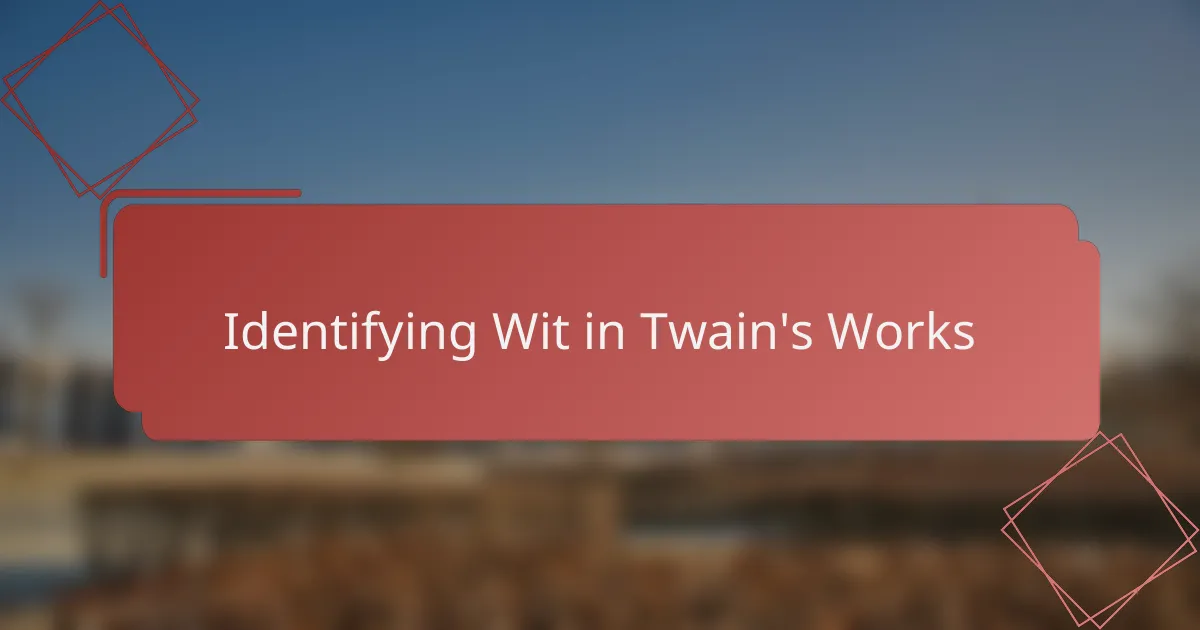
Identifying Wit in Twain’s Works
When I first tried to pinpoint Twain’s wit, I realized it’s less about outright jokes and more about how he layers meaning beneath casual words. Have you ever noticed how a simple phrase in his stories can make you smile, then pause, then reconsider your own views? That’s the hallmark of his wit — it sneaks in quietly but leaves a lasting impact.
One moment that stands out to me was while reading The Adventures of Huckleberry Finn. The way Twain uses Huck’s innocent voice to reveal society’s contradictions felt like a clever wink to the reader. It wasn’t just humor for humor’s sake; it was wit wielded as a tool to expose uncomfortable truths without triggering immediate defensiveness.
I also found that identifying his wit meant paying close attention to his use of understatement and irony. Twain often says less than he means on the surface, encouraging readers to read between the lines. This subtlety invites us to become active participants in unmasking the satire, making the experience both intellectually rewarding and deeply personal.
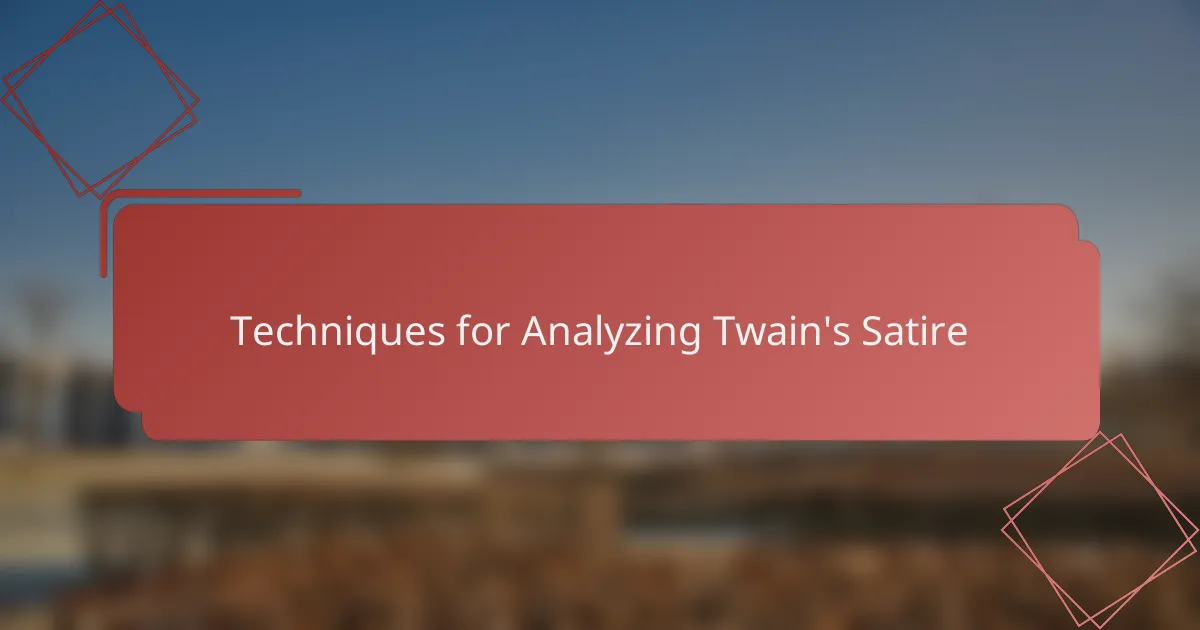
Techniques for Analyzing Twain’s Satire
One technique I keep coming back to when analyzing Twain’s satire is dissecting his use of irony. Have you ever paused mid-read to realize that what he’s saying is the exact opposite of what the situation calls for? That twist is pure Twain, and it forces me to question the surface meaning and dig deeper into the social critique beneath.
Another method I found invaluable is tracking his exaggerations. At first, I thought some of his characters were just funny or absurd, but then I saw how each ridiculous detail spotlighted real political flaws. It’s like Twain magnified the nonsense until it couldn’t be ignored, which in turn made the satire both entertaining and incisive.
I also learned to pay attention to the quiet moments—the understatements and subtle sarcasm that might seem harmless at first glance. These nuances often hit hardest because they sneak past our defenses. When I catch one of these, it feels like Twain is sharing a secret with me, inviting me into the critique without shouting it from the rooftops.
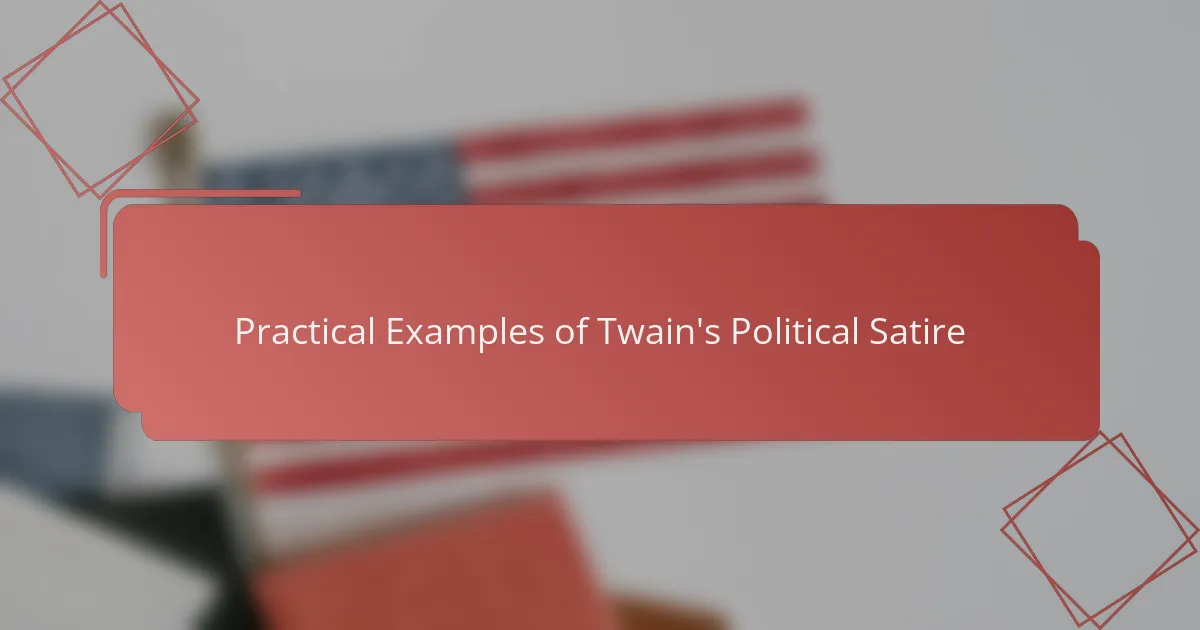
Practical Examples of Twain’s Political Satire
Mark Twain’s political satire often struck me as both sharp and surprisingly relatable. When I first read his pointed critiques of government corruption, I couldn’t help but see echoes of today’s political landscape. His ability to blend humor with serious social commentary made me reflect deeply on how satire can expose uncomfortable truths without alienating the audience.
One example that really stayed with me was Twain’s use of irony to highlight the absurdity of political promises versus actual outcomes. His style reminded me that wit can be a powerful tool to provoke thought and encourage skepticism towards authority. Here are some key examples illustrating Twain’s masterful political satire:
- In “The War Prayer,” Twain exposes the hypocrisy of patriotic fervor by contrasting public prayers for victory with the brutal reality of war.
- His depiction of politicians as self-serving and hypocritical in “The Gilded Age” reveals the widespread corruption and greed in post-Civil War America.
- Through humorous exaggeration in his speeches and essays, Twain critiques imperialist policies, questioning America’s role on the world stage.
- Twain’s satirical diary entries often mocked the ineptitude and pomposity of political figures, making complex issues accessible through humor.
- His wit shines in letters to editors, where he subtly ridiculed government officials while adhering to the confines of polite discourse.
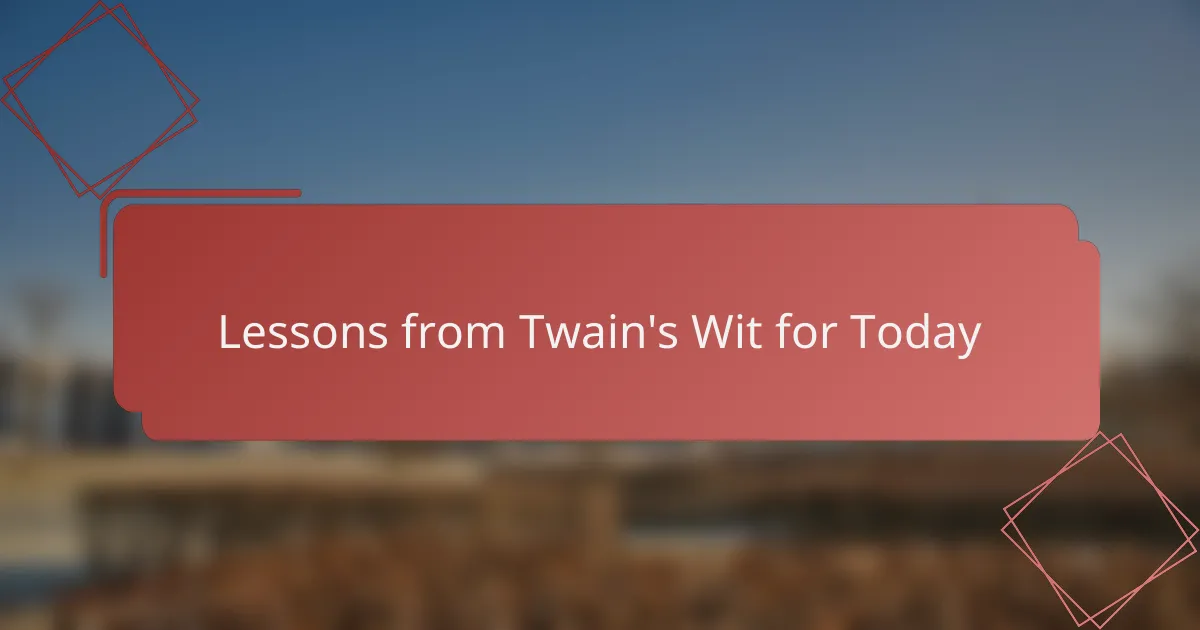
Lessons from Twain’s Wit for Today
Lessons from Twain’s Wit for Today
Mark Twain’s wit remains a beacon of sharp insight in political satire, teaching us the power of humor to expose hypocrisy. I remember the first time I read his quips—his clever use of irony made me realize how humor can be more piercing than direct criticism. His style encourages us to question authority cleverly, making serious points without alienating readers.
What strikes me most about Twain is his timeless ability to blend humor with profound social critique. It’s a reminder that today’s satirists can learn to be both entertaining and enlightening, which is essential in a world saturated with information but often lacking clear understanding.
| Aspect | Mark Twain’s Approach | Modern Political Satire |
|---|---|---|
| Use of Humor | Subtle irony and understatement to engage thoughtfully | Often bold and exaggerated to capture attention quickly |
| Target | Universal human follies and societal norms | Specific political figures and immediate events |
| Purpose | Encourage reflection and dialogue | Influence opinion and entertain large audiences |
| Tone | Witty yet respectful | Sometimes harsh or confrontational |
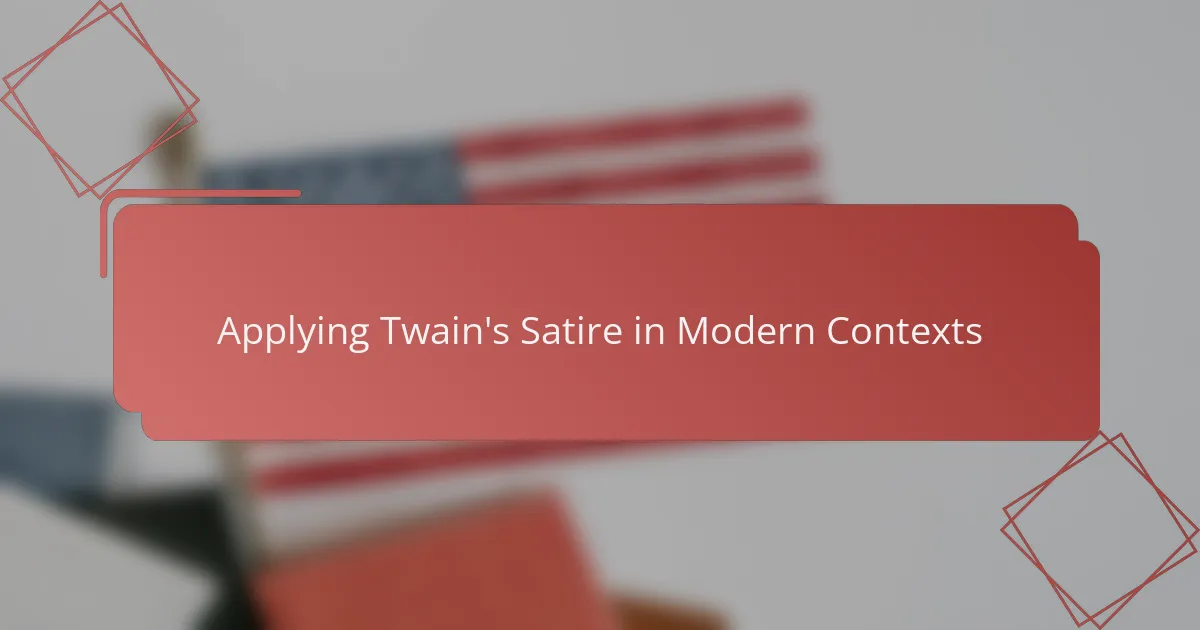
Applying Twain’s Satire in Modern Contexts
Applying Twain’s satire to today’s political landscape feels surprisingly natural. His sharp wit about human vices and societal flaws cuts through the noise just as effectively now as it did in the 19th century. I found that by channeling his style, I could highlight modern absurdities with humor and clarity, making complex issues more relatable.
| Aspect | Mark Twain’s Satire | Modern Application |
|---|---|---|
| Focus | Exposing hypocrisy and corruption in society | Highlighting political double standards and media spin |
| Tone | Witty, ironic, and humorous | Sharp, clever, often sarcastic but approachable |
| Method | Storytelling using vivid characters and exaggeration | Social media posts, political cartoons, and articles |
| Impact | Encouraged readers to question authority | Provokes thought and fosters political engagement |
